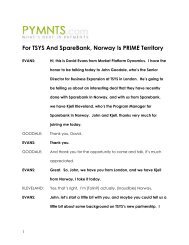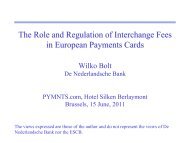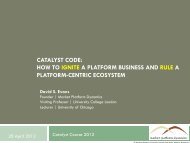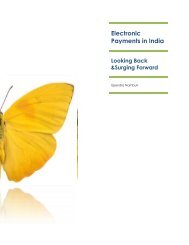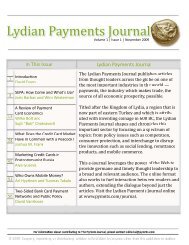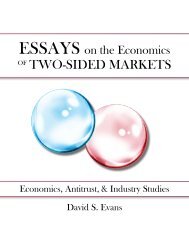Interchange Fees: The Economics and Regulations of What
Interchange Fees: The Economics and Regulations of What
Interchange Fees: The Economics and Regulations of What
- No tags were found...
Create successful ePaper yourself
Turn your PDF publications into a flip-book with our unique Google optimized e-Paper software.
24 INTERCHANGE FEESstructure that is socially optimal. And, for this reason, there is no reason to presume that unitarysystems have pricing structures near the social optimum.Empirical evidence, not theory, therefore must play the leading role in assessing whetherinterchange fees—<strong>and</strong> the resulting prices to cardholders <strong>and</strong> merchants—lead to significantunderprovision or overprovision <strong>of</strong> payment card services relative to the social optimum. In arecent discussion <strong>of</strong> the rationale for regulation <strong>of</strong> interchange in Australia, Ian J. Macfarlane,Governor <strong>of</strong> the Reserve Bank <strong>of</strong> Australia, similarly stresses the results <strong>of</strong> a factual inquiry ratherthan the deductions <strong>of</strong> economic theorists: 64…we saw that credit cards were growing faster than the other means <strong>of</strong> payment. Thiswas initially somewhat surprising as credit card transactions are more expensive than mostother means <strong>of</strong> payment—that is, they involve a larger payment from the users <strong>of</strong> the paymentssystem to the providers <strong>of</strong> the payments system. … Why was this possible?Governor Macfarlane poses almost the right question: Are payment system usage patterns significantlyinconsistent with system costs—<strong>and</strong>, it is essential to add, benefits? <strong>The</strong>re is nothingunusual about a high-cost product driving out cheaper competition if the high-cost product ismuch better. U.S. drivers generally prefer automatic to manual transmissions in their automobiles,for instance, even though automatic transmissions cost more <strong>and</strong> are more expensive to maintain.Drivers seem to believe the difference in benefits outweighs the difference in cost. 65In our context, U.S. banks typically charge consumers the same variable price for h<strong>and</strong>linga check as for h<strong>and</strong>ling a signature-based debit card payment: zero. Debit cards are nonethelessrapidly replacing checks because consumers find them more convenient.An approach that is based on careful measurement <strong>of</strong> costs <strong>and</strong> benefits has the potential todistinguish what is important from what is only a theoretical possibility. Dealing with quantitativeevidence rather than qualitative possibilities can also inform regulatory policies if regulationis deemed appropriate. Since the objective <strong>of</strong> interchange-fee regulation, where it is warranted,should be to correct the effects <strong>of</strong> a distortion <strong>of</strong> price signals, it is important to get a quantitativesense <strong>of</strong> the importance <strong>of</strong> those effects. Let us, accordingly, turn to the available evidence.Some studies have argued that payment cards are used too much, based on the observationthat they are more expensive on average for merchants than cash <strong>and</strong> checks but are neverthelessincreasing in use at the expense <strong>of</strong> cash <strong>and</strong> checks. 66 While this is intuitively appealing, it ignoresboth cardholders <strong>and</strong> the role <strong>of</strong> benefits in determining the social optimum.64Macfarlane (2005).65Similarly, as Joanna Stavins pointed out in a paper on electronic check truncation <strong>and</strong> presentment, bicycles may becheaper than cars but that does not mean that society would necessarily be better <strong>of</strong>f if bicycles replaced cars. Stavins(1997, p. 28).66See, for example, Balto (2000) <strong>and</strong> Reserve Bank <strong>of</strong> Australia (2002).



